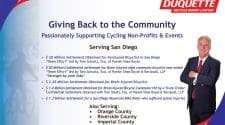By Richard Duquette, Esq, Law Firm of Richard Duquette
Listen to the Podcast
In an attempt to escape responsibility for a bicycle injury claim, insurance companies commonly argue that you, the bicyclist, assumed the risk of injury by hopping on your bicycle. They argue this assumption of risk in three ways, some of which can be less than fair.
1. Written Release. The most typical way insurance companies argue assumed risk is through a written release that expressly identifies the risks associated with bicycling (like colliding with other bicyclists during a race or sliding out while coming around a corner). However, if the release is vague or ambiguous about these dangers, then it is invalid, as ambiguities are interpreted against the drafter in accordance with the law (California Civil Code Section 1654).
The scope of the release must be clear; if the release attempts to claim a risk not typically associated with bicycling, it may also be invalid. For example, a written release wouldn’t normally be applicable to an athlete who was injured by defective products or equipment, a person not directly involved in the injury, or if a volunteer lets a car on the race course and it hits a racer.
Unfortunately, insurance companies don’t need a written release to claim you assumed the risk of injury while bicycling—they can assert primary and secondary assumption of the risk without a written release.
2. Primary Assumption of Risk. Primary assumptions of risk are the lawfully asserted risks inherent in a sport-risks, like encountering ice while snow skiing or racing bicyclists taking turns too fast.
It is the popular opinion that if the courts were to award compensation to athletes injured by these inherent risks, they would be deterring vigorous recreation and competition among participants, altering the face of the sport forever.
3. Secondary Assumption of Risk. The secondary assumption of risk, however, is completely different. This is akin to “comparative fault”, which is what happens when the fault is allocated based on the degree of risk in the conduct. For example, a bicyclist riding a poorly-maintained bicycle that failed may be more “at fault” than a bicyclist riding a well-maintained bicycle. The injuries sustained by the former bicyclist weren’t due to the sport of bicycling, they were due to the negligent risk-taking of the bicyclist.
Bicyclists are, in general, aware that they cannot do what they love without enduring a little risk. However, bicyclists should also remember that responsibility is a two-way street: it is the cyclist’s responsibility to ride defensively on a well-maintained bicycle, but it is the insurance industry’s responsibility to accept their fair share of fault without the legal spin.
What’s the best advice? Know your rights, ride safe, and if injury should occur, hire an experienced trial attorney to help you keep it fair.
Ride safe! Ride strong!
Enjoy More Articles and Podcasts By Richard Duquette, Esq, Law Firm of Richard Duquette
About the Law Firm of Richard L. Duquette
The Law Firm of Richard Duquette has recovered millions in damages for injured bicyclists since 1983. Attorney Duquette is an experienced bicyclist himself and has dedicated his practice to helping this community. He is experienced in all types of cases involving bicycle crashes, injuries, and other legal troubles.
Mr. Duquette serves a wide variety of bicyclists. Whether you prefer road cycling, mountain biking, track riding, Randonneuring, E-Bicycles, Handcycles, Century Rides, Triathlons, Duathlons, or Criterium, Mr. Duquette knows how to best serve your legal needs regardless of the type of bicyclist you are.
Mr. Duquette is an expert at maximizing, proving, and recovering damages.
For more information please visit the Law Firm of Richard Duquette.
The information in this article is for general information purposes only. The focus of this article is on California Law. You should contact an attorney in your state for case-specific advice, as details of the law and procedural requirements vary from state to state. Nothing in this article should be taken as legal advice for any individual case or situation. This information is not intended to create an attorney-client relationship; and the receipt, reading, listening, or viewing of this content shall not constitute an attorney-client relationship. Nothing in this article shall be construed as a warrant, promise, or guarantee about the outcome of your case or any other matter. This information may contain personal impressions or statements of opinion on a subject that do not apply in your case. Further, statements of law reflect the current state of the law at the time of writing and/or recording, and may not reflect subsequent changes in the law.















